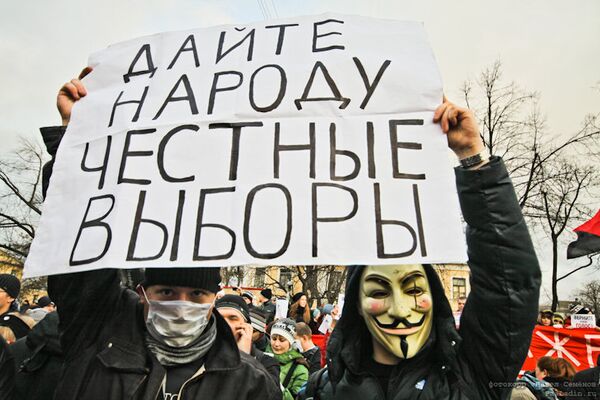Moscow’s City Hall has authorized a 50,000-strong opposition march followed by a rally in downtown Moscow to protest the results of the recent parliamentary elections, Deputy Mayor Alexander Gorbenko said on Thursday.
“City Hall approved one of the variants proposed by protest organizers,” Gorbenko said.
The procession will be held within the boundaries of the Garden Ring, a circular avenue in the Russian capital’s center, on February 4, which is the way the organizers wanted, the liberal Ekho Moskvy radio reported.
Protesters will go down Bolshaya Yakimanka Street to Bolotnaya Square, a venue for previous large-scale protests against alleged fraud at the December 4 State Duma elections that critics claimed were marred by ballot stuffing and other irregularities. The event will culminate in a rally on the square.
Gorbenko said “a variant acceptable to both parties has been agreed,” adding that liberal journalist Sergei Parkhomenko and opposition politicians Vladimir Ryzhkov and Gennady Gudkov took part in the talks, which ended after midnight.
The approval came after a previously unsuccessful attempt by the opposition on January 20 to claim another venue in downtown Moscow for the demonstration.
Prime Minister Vladimir Putin-led United Russia party won December’s elections but critics claimed the vote had been slanted in favor of United Russia. The authorities admitted that minor violations had occurred during the vote and pledged to probe them, but denied claims that the irregularities affected the vote’s results.
Vote rigging allegations led to the largest anti-government protests for almost two decades, with demonstrators demanding a rerun and the dismissal of Vladimir Churov, the head of the Central Election Commission, dubbed “the wizard” following the vote.
Putin, who held the presidential post in 2000-2008, is considered the most likely candidate to win the presidential election on March 4. However, analysts say his declining popularity could see him forced into a runoff.
In order to avoid accusations of electoral fraud at the forthcoming presidential polls, the premier pledged in December 2011 that nearly all 95,000 polling places in Russia will be equipped with webcams by the time of the March election. The installation will cost up to 15 billion rubles ($489 million).

